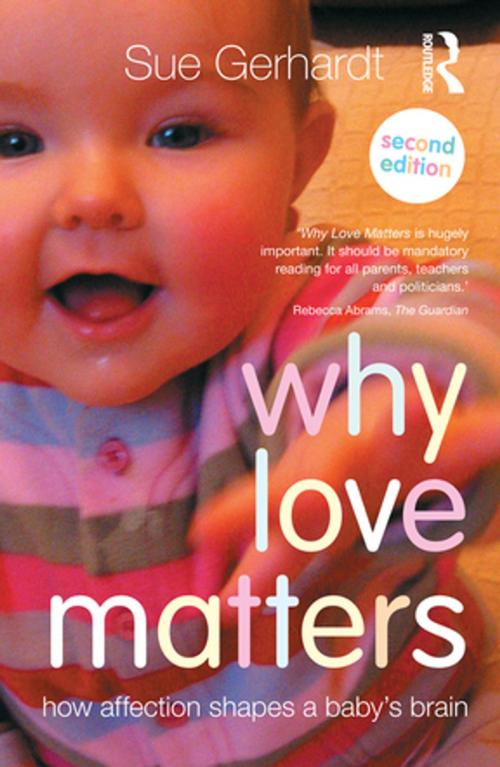Why Love Matters
How affection shapes a baby's brain
Nonfiction, Health & Well Being, Psychology, Child & Adolescent, Child Psychology, Family & Relationships, Babies & Toddlers, Infants & Toddlers, Parenting| Author: | Sue Gerhardt | ISBN: | 9781317635796 |
| Publisher: | Taylor and Francis | Publication: | October 24, 2014 |
| Imprint: | Routledge | Language: | English |
| Author: | Sue Gerhardt |
| ISBN: | 9781317635796 |
| Publisher: | Taylor and Francis |
| Publication: | October 24, 2014 |
| Imprint: | Routledge |
| Language: | English |
Why Love Matters explains why loving relationships are essential to brain development in the early years, and how these early interactions can have lasting consequences for future emotional and physical health. This second edition follows on from the success of the first, updating the scientific research, covering recent findings in genetics and the mind/body connection, and including a new chapter highlighting our growing understanding of the part also played by pregnancy in shaping a baby’s future emotional and physical well-being.
The author focuses in particular on the wide-ranging effects of early stress on a baby or toddler’s developing nervous system. When things go wrong with relationships in early life, the dependent child has to adapt; what we now know is that his or her brain adapts too. The brain’s emotion and immune systems are particularly affected by early stress and can become less effective. This makes the child more vulnerable to a range of later difficulties such as depression, anti-social behaviour, addictions or anorexia, as well as physical illness.
Why Love Matters explains why loving relationships are essential to brain development in the early years, and how these early interactions can have lasting consequences for future emotional and physical health. This second edition follows on from the success of the first, updating the scientific research, covering recent findings in genetics and the mind/body connection, and including a new chapter highlighting our growing understanding of the part also played by pregnancy in shaping a baby’s future emotional and physical well-being.
The author focuses in particular on the wide-ranging effects of early stress on a baby or toddler’s developing nervous system. When things go wrong with relationships in early life, the dependent child has to adapt; what we now know is that his or her brain adapts too. The brain’s emotion and immune systems are particularly affected by early stress and can become less effective. This makes the child more vulnerable to a range of later difficulties such as depression, anti-social behaviour, addictions or anorexia, as well as physical illness.















